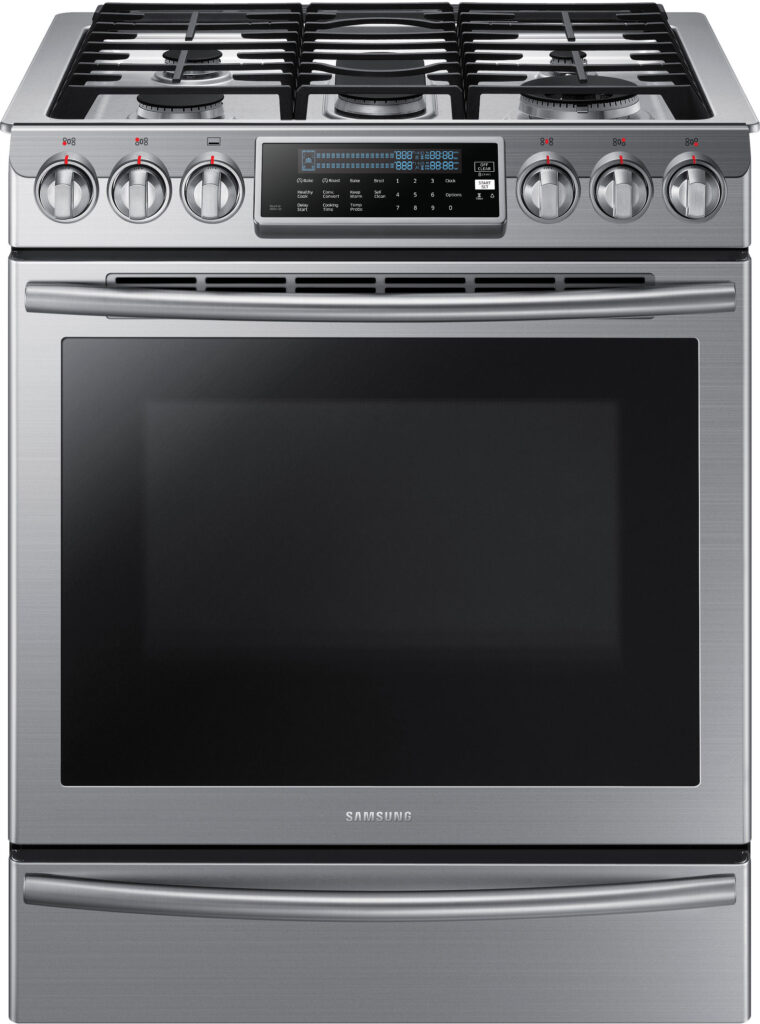Choosing between a gas or electric range is a common dilemma when it comes to upgrading the kitchen. Many people think that electric ranges and stoves are cheaper to run, while others swear by gas for their cooking and baking needs.
In this blog post, we’ll examine the cost, energy efficiency, safety, and temperature control between gas versus electric. Understanding the pros and cons of each type can help you decide what’s right for your home before you buy.

Gas Versus Electric Ranges
Gas stoves, while offering quick and accurate heat control over electric alternatives, need a gas line. They also require proper ventilation to ensure safe operation. With their flameless design and metal heating elements, electric stoves can be easier and cheaper to install, making them a practical choice for your kitchen.
Comparing Costs
When it comes to comparing costs between gas and electric ranges, the price depends on the model, brand, features, and size.
If you don’t already have a gas line in your kitchen, getting one installed may make a gas range more expensive upfront. However, over time, if you’re a frequent cook, gas ranges could prove more cost-effective than their electric counterparts.
Electricity rates swing across states, averaging roughly $0.12 per kWh. Similarly, gas prices fluctuate based on location, with the typical cost of a therm hovering around $0.95 per therm. If you do the math, a gas range may save you money on your monthly energy bills if you cook frequently.
Energy Efficiency
When it comes to energy efficiency, gas ranges are more efficient compared to electric ranges. This is because gas ranges convert heat energy directly to the cooking pot, which makes them more efficient. For a more energy-efficient and quicker cooking solution, opt for a gas range. Unlike electric ranges, which consume significant energy to heat their coils, gas ranges provide immediate heat, saving both time and power.
Safety
Gas and electric ranges each have safety considerations. The open flames of gas ranges can pose fire risks, while the hot coils of electric ranges can cause burns. To enhance safety, adhere to manufacturer guidelines, use heat-resistant cookware, and set up smoke detectors in your kitchen.
Temperature Control
Lastly, when it comes to temperature control, gas ranges offer more precise heating compared to electric ranges. Gas ranges heat up quickly and bring food to the desired temperature faster than electric ranges. Electric ovens, however, distribute heat more evenly than gas ovens, making baking and roasting easier.
Gas vs. Electric Ranges: Considerations for Choosing the Perfect Fit for Your Home
Choosing between gas and electric ranges? Consider factors like cost, energy efficiency, safety, and temperature control to find what’s best for your home.
For quick, accurate heat control, opt for a gas range. If you want a faster installation process and easier cleaning, choose an electric range. In either case, make sure to follow the manufacturer’s instructions, use only heat-resistant cookware, and install smoke detectors in your kitchen.
If you opt for a gas range and need a gas line installed or relocated, turn to The Gas Connection. We’ve been providing gas line installations and repairs in Colorado since 1980. Contact us today to learn more about our services.